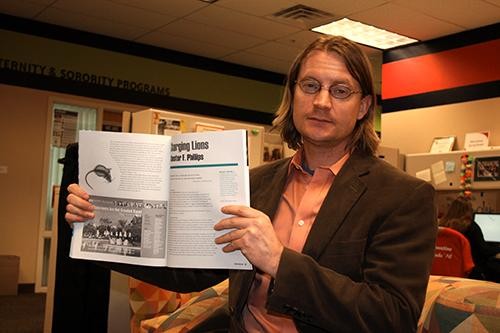There’s no doubt that Chester F. Phillips has led an interesting life. Recently transferred into the CSIL section of the Student Union Memorial Center, his office is essentially barren, but he stands comfortable in a button-up, jeans and boots. He seems content in the academic setting as the Graduate Assistant for Sustainability at the University of Arizona while pursuing a doctoral degree in arid lands resource sciences.
But he’s no mere academic. As a man who’s tried his hand at everything, from a fire lookout to a rainwater harvester, he’s never classified himself as a compartmental thinker. From an early age, Philips has challenged some of the blind thinking of modern society, smoothly combining his love of science with a talent for writing. Disillusioned with the East Texas society of his childhood, he turned an eye inward, assessing where he was in life as a young adult.
“”Things I thought were meaningful weren’t anymore and I started asking ‘What do I believe in, and how can I make a life in accordance with it?'”” Phillips said.
This self-evaluation eventually drove Phillips to Cascabel, a 200-person town of washboard dirt roads along the San Pedro River. As an inexperienced 20-something, he began working as a rancher, learning to respect the animals he interacted with and rebelling against the subjugation of creatures and resources rampant in factory farming.
Eventually returning to the classroom, Phillips pursued an MFA in nonfiction at the University of Arizona in 2009, graduating with a thesis that explored the themes in his life, including his five and a half years of experience as a ranch hand.
The entirety of the MFA thesis, around 200 pages, is not memoir, nor is it purely scientific. Phillips describes it as “”inherently political in the broad sense,”” as his life choices were radical and politically motivated. Phillips utilizes his personal stories to get across much larger issues, such as the drive for vengeance and the difficulty of social roles placed on men. His experiences serve as the vertebrae of myriad essays that reach out toward the world like ribs.
“”Charging Lions”” is a stand-alone segment of his MFA thesis that recently won the Creative Nonfiction Editors’ Prize for Best Creative Nonfiction Essay about Animals, receiving publication in issue 40, an animal issue released earlier this month.
The essay explores the dilemmas of killing and eating animals that you’ve raised and cared for as a “”tender carnivore.”” From the tribulations of an adorable raccoon family, to witnessing the slaughter of a well-known cow and an eventual confrontation with a mountain lion, Phillips’ essay is a poignant reflection upon human interactions and relationships with animals.
“”There doesn’t need to be a clear line between storytelling and science,”” Phillips said of his approach to creative nonfiction. In today’s world, we have a lot of faith in technology, but not much understanding of how the actual science works. Phillips believes that the struggle of creative nonfiction often stems from trying to tell stories that everyone can understand and appreciate.
When discussing the role of literature in his life, Phillips quoted environmental essayist Barry Lopez: “”Everything is held together with stories. That is all that is holding us together, stories and compassion.”” These stories are more than just literature, he explained, but the stories we tell each other and the ways we form relationships. According to Phillips, our cultural and national identity is the degree to which we share and believe in a common story.
So what advice does Phillips have for aspiring writers?
“”Find your own voice and then the forums that fit it. Don’t try to meet a trend,”” he suggests.
On the road to publication, he heeded his own advice. Walking through a convention for the Association of Writers and Writing Programs in Denver, Phillips picked up publications to see if his work would be a good match until he discovered the contest for animals with the Creative Nonfiction Foundation. Since his publication, agents in New York are perking up, seeing all that Phillips has to offer and asking for more.
In the meantime, Phillips is devoting himself to his duties as the Graduate Assistant for Sustainability. Striving to make the UA an example of sustainability in the desert, he is involved with rainwater harvesting on campus and helping student projects get off the ground. Phillips is currently trying to encourage the food system to utilize more students and move toward local products. Additionally, he is starting a composting project that would turn the food waste from the Union into marketable products. “”If the University of Arizona isn’t a learning laboratory for the rest of the community, then what institution can lead the way?”” Phillips asked. He encourages any student interested in making campus more sustainable to talk to him.
A man with quite a history and a promising future, the publishing world has not seen the last of Chester Phillips’ craft just yet. The trick to striking a balance between success and satisfaction, he says, is to “”figure out what you would like to say and contribute to a world always in peril and in need of celebration.””









